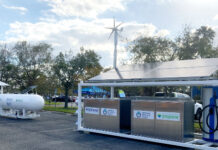Some contractors use cylinder exchange, some use on-site infrastructure, and some use both for mowers and vehicles fueled by propane autogas
Landscape/lawn service contractors entering the 2011-12 equipment-purchasing season will investigate alternatively fueled mowers and vehicles with increased scrutiny this year. Economic and environmental factors continue to be strong drivers in the landscape/lawn service industry. Equipment enhancements and propane technology improvements provide contractors with many choices while evaluating the options.

ACLS, Inc., a Fresno, Calif., landscape planning, design and maintenance company, added 12 Exmark propane-fueled walk-behind mowers to its equipment lineup in 2011.
PHOTO COURTESY OF ACLS, INC.
That’s why many contractors are gathering information about propane-fueled commercial mowers and work trucks fueled by propane autogas. According to Propane Education & Research Council (PERC) research, two of the most important factors for contractors considering the purchase of alternatively fueled mowers and vehicles are fuel availability and ease of refueling. The good news is those factors are easily addressed with propane-fueled mowers and work trucks fueled by propane autogas.
For example, nearly 90 percent of U.S. propane supplies are produced domestically, and with 56,000 miles of pipeline, propane is readily available as an on and off-road engine fuel in the U.S. Refueling options such as a cylinder exchange program for propane-fueled mowers, or an on-site refueling infrastructure makes refueling mowers or work trucks fueled by propane autogas very efficient.
Sometimes, a contractor will adopt a dual approach. For example, ACLS, Inc., a Fresno, Calif., landscape company that offers planning, design and maintenance services, incorporated propane-fueled commercial mowers into its operation in early 2011 and utilizes both a propane cylinder exchange program and an on-site refueling infrastructure to refuel its 12 Exmark propane-fueled walk-behind mowers. The result is easy refueling and a high-performing, sustainable operation that is also cost-effective; ACLS is projecting potentially $100,000 in fuel and maintenance cost savings over the next five years.
Cost savings
More than 30 models of propane-fueled mowers are available from industry-leading brands, including Cub Cadet, Dixie Chopper, Exmark, Ferris Industries, Gravely, Husqvarna, Scag Power Equipment, Schiller Grounds Care/Bob-Cat, Snapper Pro and Zipper Mowers. Propane-fueled commercial mowers typically hold one to two fuel cylinders for a combined fuel capacity of about 15 gallons. Cylinders are easy to swap out, minimizing downtime.
Propane-fueled mowers reduce greenhouse gas emissions by nearly 50 percent and carbon monoxide emissions by more than 80 percent when compared with gasoline-fueled mowers. They also meet and exceed all Environmental Protection Agency (EPA) standards, and if sold in California, the more stringent California Air Resources Board (CARB) standards.
Contractors may save money by using propane-fueled commercial mowers rather than gasoline-fueled counterparts for several reasons. Propane-fueled mowers may be permitted to operate where and when local regulations ban gasoline-fueled mowers to protect air quality. They are safer to use during pollution advisory periods, such as ozone action days, because they emit significantly fewer ground-level ozone precursors and particulate matter, the pollutants considered most harmful to human health. Additional cost savings can be gained from reduced fuel spillage, decreased maintenance costs and longer engine lives.
Contractors can increase cost savings even more with on-site fuel delivery versus traveling to a conventional off-site fueling station. In fact, the speed and ease of propane refueling is comparable to that of gasoline or diesel, and does not result in spillage or leakage.
Contractors can work with their local propane provider to determine whether a propane cylinder exchange program or on-site refueling infrastructure best fits their needs.
Cylinder exchange
Cylinder exchange programs, which were first established for the propane-fueled forklift market, are directly applicable to the propane-fueled commercial mower market. In a cylinder exchange program, a propane provider typically installs a secure cage in a convenient location at company headquarters. Employees are able to swap out propane cylinders as needed and place empty cylinders in the cage. The propane provider subsequently replaces empty cylinders with full ones, or refills the company’s existing cylinders on-site during regularly scheduled deliveries. In addition to conserving both time and resources for contractors, such programs also typically offer a variety of fuel contract options.
ACLS Chief Executive Officer Tom De Lany and General Manager Jamie Rust have more than 35 years of experience maintaining municipal, residential and large commercial properties in and around Fresno, Calif. The company began investigating propane-fueled mowers in 2010, due to rising conventional fuel costs and environmental considerations.
ACLS worked with Heritage Propane to develop the best approach to refueling its 12 Exmark 21, 48 and 72-inch deck propane-fueled mowers. Heritage Propane placed a 100-gallon propane tank with a no-spill dispenser on ACLS’s property so the company can refuel cylinders for its 21-inch deck mowers, while Heritage refills cylinders for the larger mowers.
“The cylinder exchange program is very easy,” Rust says. “We have 50 cylinders in a storage cage in our yard, and that’s enough to get us through one week. They are used by our mower operators as needed, and Heritage Propane comes to fill them once per week. It’s very simple.”
Heritage Propane provided refueling training during a one-day class at ACLS’s headquarters to show the entire staff how to properly install and refill the propane cylinders. ACLS’s mower operators are finding that the propane-fueled mowers are easier to refuel than the gasoline-fueled models they were previously using.

ACLS, Inc. uses an on-site refueling infrastructure and a propane cylinder exchange program to fuel its propane-fueled walk-behind mowers. Heritage Propane refills the cylinders for the larger mowers on a weekly basis and stores them in cages on company property.
PHOTO COURTESY OF ACLS, INC.
On-site refueling
Contractors adopting propane-fueled mowers and work trucks fueled by propane autogas can also refuel via a centralized, on-site infrastructure. Depending on storage necessity, longevity and available space, managers can choose between several options:
- skid-mounted aboveground portable platforms,
- permanent aboveground stations; or
- underground storage tanks.
Skid-mount systems are typically preassembled, making installation or relocation quick and inexpensive, while allowing for safe refueling without the permanence of stationary systems. Skid-mount systems are usually composed of an aboveground propane tank, dispenser, pump, piping and control panel mounted on a concrete or steel frame to create a portable unit that can be installed, and then relocated in a matter of days if necessary. They require no permanent changes to the installation site. Permanent aboveground or underground storage tanks are an option for long-term use.
ACLS’s on-site refueling infrastructure has complemented its cylinder exchange program and increased convenience for Rust and his mower operators.
“Since Heritage Propane is willing to fill our 48- and 72-inch mower cylinders, it’s one less thing I have to worry about,” Rust says.

Lawn care and landscape contractors adopting propane-fueled mowers and work trucks fueled by propane autogas can refuel via a centralized, on-site refueling infrastructure, typically consisting of a large propane tank and a no-spill dispenser.
PHOTO COURTESY OF MCCOY’S LAWN EQUIPMENT SUPERSTORE.
Propane-fueled trucks
ACLS is also planning to add new work trucks fueled by propane autogas in the near future. Over the past 20 months, 10 new vehicle platforms fueled by propane autogas have been introduced to the market, which includes pickup trucks that contractors use to transport mowers, equipment and personnel to and from customer sites. Those trucks can be refueled with an on-site refueling infrastructure or at thousands of refueling stations across the country that make propane autogas readily available for off-site refueling. Contractors and drivers can locate stations via the Energy Department’s Alternative Fuels and Advanced Vehicle Data Center (www.afdc.energy.gov/afdc). There are more propane refueling stations in the U.S. than for any other alternative fuel, with at least one station in every state.
There are a number of ways for contractors to reduce costs by adopting trucks fueled by propane autogas. The federal government and many states offer programs to encourage the use of propane autogas as an engine fuel. Currently, a 50-cent-per-gallon alternative-fuel tax credit is available for on-road vehicles fueled by propane autogas. Federal tax credits are also available for 30 percent of the equipment and installation cost – up to $30,000 – of alternative refueling structures. Contractors should consult their tax adviser regarding claims for credits or refunds, and the IRS website for appropriate dates and forms.
Lawn service contractors can learn more about propane-fueled commercial mowers, work trucks fueled by propane autogas, and available refueling options by visiting www.poweredbypropane.org. Local propane providers can help determine which refueling option is the best fit—a propane cylinder exchange program, an on-site refueling infrastructure or, like ACLS, a dual approach based on a contractor’s needs.
Contractors also can learn more about mowers, trucks and available refueling options by visiting PERC’s Propane Pavilion (booth number 11198) at the Green Industry & Equipment Expo (GIE+EXPO), to be held from October 27 to 29 at the Kentucky Exposition Center in Louisville, Ky.
Brian Freehan is vice president of The Propane Education & Research Council (PERC) that was authorized by the U.S. Congress with the passage of Public Law 104-284, the Propane Education and Research Act (PERA), signed into law on October 11, 1996. The mission of PERC is to promote the safe, efficient use of odorized propane gas as a preferred energy source through research and development, training and safety initiatives.











![[VIDEO] Dickies®: Discover Workwear That’s Anything But Uniform](https://turfmagazine.com/wp-content/uploads/2023/06/1647663814-4b1a2a7742790a9b1e97a3b963477850192e1d6a9dfba9b07214a77bae25d6e3-d-218x150.jpg)




























![[VIDEO] Dickies®: Discover Workwear That’s Anything But Uniform](https://turfmagazine.com/wp-content/uploads/2023/06/1647663814-4b1a2a7742790a9b1e97a3b963477850192e1d6a9dfba9b07214a77bae25d6e3-d-324x160.jpg)